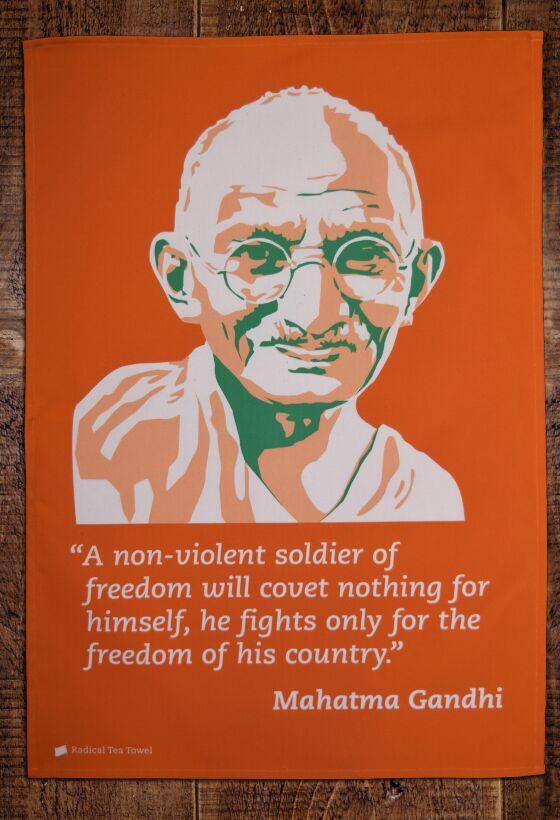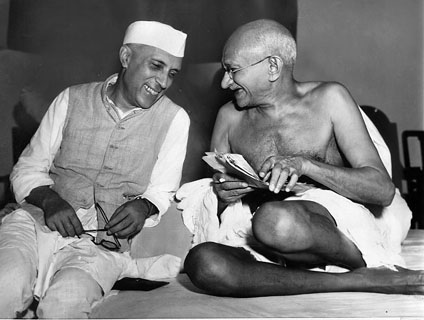Divide & Rule: The Brutality of the British Empire
Posted by Pete on 14th Aug 2018
One of the favourite lies told by Britain's imperial apologists is that the decolonisation of the British Empire was 'bloodless'.
If they were to tell that to the people of the Indian sub-continent - who secured their independence 71 years ago on the 14th (Pakistan) and 15th (India) August 1947 - it wouldn't stand up to their historical experience for long.
After decades of oppressing India, the colonisers were hightailing out of there. Post-war Britain was bankrupt and she didn't want to pay for one more day of administration and policing than she had to. The Empire was crumbling.
Good news for India? Not quite.

Gandhi's opposition to divide and rule
For the better part of two centuries, the Empire had been consciously fostering ethno-religious division to secure its control of the sub-continent, not least between the Hindu majority and large Muslim minority.
By 1947, given the strength of this division, calls for a partitioned independence seemed more and more likely to come true.
Instead of a federal and multi-religious India, there would be two new countries organised on religious lines: Hindu (and Sikh) 'India' and Muslim 'Pakistan'.
There were voices - most famously Mahatma Gandhi - who opposed this fiercely. Surely all Indians were Indian, regardless of their religion?
But by the summer of 1947, major political leaders - including Jawaharlal Nehru of the (mainly Hindu) Indian National Congress, and Muhammad Ali Jinnah of the Muslim League - were all agreed on 'Partition'.

The violence of the Indian Partition
But there was a problem: millions of people found themselves on the 'wrong side' of the agreed border. There were Muslims living in India, and Hindus and Sikhs in Pakistan.
Once independence was declared in August 1947, the consequences of this situation, amid spiralling rhetoric and accumulated tension, were deadly.
As 14.5 million people moved in both directions across the new border to get to 'their' state, possibly as many as two million were murdered in a horrific wave of ethnic violence.
In areas like the Punjab, Bengal, and Sindh, defenceless Muslims were massacred by Hindu majorities and defenceless Hindus were massacred by Muslim majorities.
Often the violence was begun by the survivors of attacks elsewhere, seeking revenge.
Britain - the responsible state power - had made no provisions for maintaining public order in this wholly predictable scenario.
At the one moment in the entire history of India when British armed forces could have saved the people of the sub-continent rather than enslaved them, they went AWOL.
And, what's worse, India wasn't the only part of the British Empire whose first experience of independence was the bloody tragedy of partition and massacres.
A bloody end to Britain's Empire
The British government split Ulster from the rest of Ireland, precipitating pogroms against Catholics in Belfast and a massive civil war on the Republican side over whether to bow to the Empire's conditions.
We celebrate the defiant stand taken for Irish freedom in Easter 1916, but civil war and sectarianism was the great immediate legacy of Irish independence.
In British-controlled Palestine, as well, a partition of the land was enforced which more or less guaranteed the war of 1947-8 and the forced displacement of over 700,000 Palestinians.
On reflection, then, I guess this hasn't been the cheeriest of emails for marking an Independence Day.
Anything less, though, just wouldn't be true.
While Indian Independence in 1947 was a formidable achievement - the result of decades of anti-colonial resistance - it was also just the beginning of a longer, still-ongoing fight to free that land from the strangling legacies of imperialism.
Across the old British Empire, from Guyana to Gujarat, its effects continue to bite - economic exploitation, sectarianism, cultural uncertainty, displacement.
The struggle against empire continues.
